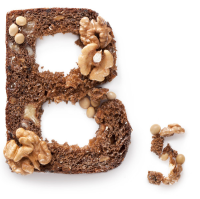Vitamin B5
 Vitamin B5 may be the most boring vitamin because it is so plentiful. A deficiency in vitamin B5 is believed to be a rare happening as this vitamin (also known as pantothenic acid) is found in virtually every single food. Pantothenic acid is needed to turn food into energy.
Vitamin B5 may be the most boring vitamin because it is so plentiful. A deficiency in vitamin B5 is believed to be a rare happening as this vitamin (also known as pantothenic acid) is found in virtually every single food. Pantothenic acid is needed to turn food into energy.
Pantothenic acid is especially important for optimal adrenal function, making it a good choice for "de-stressing."
Why People Need Vitamin B5
Pantothenic acid is vital in turning the carbohydrates and fats a person consumes into energy. This vitamin is critical in making two coenzymes that are crucial to the body's health: coenzyme A (CoA) and acyl carrier protein (ACP). While these enzymes help to use fats and carbs for energy, they also are needed to make important hormones, for making healthy red blood cells, and for making vitamin D.
These coenzymes are so important to the body that almost all the pantothenic acid received from food is immediately turned into CoA and ACP and there is not much left over for any other uses.
While pantothenic acid does not help high cholesterol, pantethine (also found in vitamin B5) does seem to help. More research is needed but the studies are promising. So far, it seems that pantethine may aid in lowering overall cholesterol and triglycerides, if those levels are high to begin with. Pantethine may also help to raise the HDL (good) cholesterol levels.
For people who are already athletes, pantothenic acid may boost their performance just a little bit. Bodybuilders, long-distance runners and other very serious athletes claim pantothenic acid helps them to train harder. One study did back up this claim, but not by a lot. A group of long-distance runners who consumed 2 g a day performed better than those athletes who did not, but again, not by an extensive amount.
Vitamin B5 Requirements
While most vitamins and minerals have established RDSa, pantothenic acid is the exception. There is no RDA for this vitamin because the average person consumed between 4 and 10 mg of pantothenic acid every day. Instead, pantothenic acid has an Adequate Intake because almost no one is deficient. However, 4 to 7 mg is believed by many physicians and nutritionists to be necessary for optimal health.
Pantothenic acid is probably one of the lesser-known B vitamins. This vitamin does work better when a person also has enough of the other B vitamins, in particular niacin, riboflavin, thiamin, pyridoxine and biotin.
When the Body is Deficient
For pantothenic acid, a person would almost have to deliberately work at being deficient. Even the name sums this vitamin up: it comes from the Greek word pantos, meaning "everywhere."
The only people who are really at risk for a deficiency of pantothenic acid are long-term alcoholics. Anyone else who is low is probably going to be low in all the B vitamins as well.
Pantothenic acid is sometimes called "the anti-stress" vitamin because the body can make more of some hormones that need pantothenic acid when a person is under a lot of stress. For those people who feel more pantothenic acid will help a stressful phase, it may be worth a try.
Symptoms of Vitamin B5 Deficiencies
Because there is no evidence of many people being deficient, the symptoms would normally be a lack of energy, as would be the case in many of the B vitamins.
Foods Containing Vitamin B5
Since pantothenic acid is present in just about any food, animal or vegetable, it is not necessary to eat certain food groups in order to have a sufficient amount of this vitamin. Salmon, organ meats, beans, eggs, milk, and whole grains are the best sources for this vitamin. Many B vitamins are also added back into foods such as bread, pasta, rice, breakfast cereals and baked goods.
References
- Alan H. Pressman and Sheila Buff.(2007). The Complete Idiot's guide to vitamins and minerals. New York : Alpha Books
- Brewer, S. (2010). The essential guide to vitamins, minerals and herbal supplements. London : Right Way
- Elson M. Haas, Md & Buck Levin, Phd, Rd.(2006). Staying Healthy with Nutrition: The Complete Guide to diet and nutritional medicine. Berkeley, Calif. : Celestial Art
- Holford, P. (2004). The optimum nutrition bible. London : Piatkus
- Holford, P & Lawson, S.(2008). Optimum Nutrition Made Easy How to achieve optimum health. London : Piatkus
- Lieberman, S. & Bruning, N. (2003). The Real Vitamin & Mineral Book. New York : Avery
- Rodale Health Books.(2009). Healing with vitamins : the best nutrients to slow, stop, and reverse disease. Emmaus, Pa. : Rodale
- Royston, A.(2003). Vitamins and minerals for a healthy body. Oxford : Heinemann Library
- The National Research Council.(1989). Recommended Dietary Allowances, 10th ed, National Academy of Sciences
- Werbach, M. (1993). Nutritional Influences on Illness. 2nd ed. Los Angeles: Third Line Press
Posted in Vitamin B5
Ask a Question Or Join a Discussion


